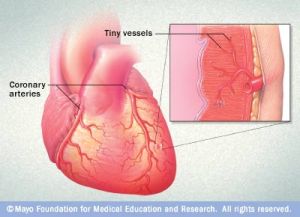 by Carolyn Thomas ♥ @HeartSisters
by Carolyn Thomas ♥ @HeartSisters
Should we invent a new name for women’s heart disease? A review on the topic of gender differences in heart disease reminds us what many heart attack survivors already know: when it comes to heart attacks, women are not just small men.
Standard cardiac treatment typically focuses on obstructive coronary artery disease, which up to half of women may not ever experience. In obstructive coronary artery disease, the large blood vessels in the heart can become blocked through atherosclerosis, a condition in which fatty cholesterol streaks build up in the arteries.
In fact, the Framingham Risk Score, based on a study of over 5,000 participants (and their descendents) followed since 1948, is the traditional measure of heart disease risk, yet this scale mistakenly classified almost 90% of women as low risk – which is hard to get your brain wrapped around given that more women than men die each year from heart disease.
But in small vessel disease, the narrowing of the very small arteries in the heart means they can’t expand properly. As a result, your heart muscles don’t get an adequate supply of oxygen-rich blood. This inability to expand is called endothelial dysfunction. This problem may cause your small vessels to become even smaller when you’re active or under emotional stress. The reduced blood flow through the small blood vessels causes chest pain and other debilitating symptoms similar to those you’d have if you were having a heart attack.
For many women, their biggest cardiac issue is not a coronary artery blockage, but this reduction in blood flow, called ischemia, in those very small arteries of the heart, says Dr. C. Noel Bairey Merz, director of the Women’s Heart Center at Cedars-Sinai Medical Center in Los Angeles.
She is the lead author of a review on this topic published in the Journal of the American College of Cardiology. Dr. Bairey Merz told Health News reporter Kathleen Doheny of WebMD:
”Women, particularly at midlife, ages 45 to 65, are more likely to have abnormalities of the function of the small arteries – blood vessels so small that you do not even see them on the traditional diagnostic angiogram. Women patients are more likely to be falsely reassured – when in fact there really is a problem.”
 Dr. Bairey Merz and her colleagues even propose that the term coronary heart disease or CHD be used when the problem is obstructed major coronary vessels, but that the term ischemic heart disease or IHD be used when the problem is reduced blood flow because of small artery problems.
Dr. Bairey Merz and her colleagues even propose that the term coronary heart disease or CHD be used when the problem is obstructed major coronary vessels, but that the term ischemic heart disease or IHD be used when the problem is reduced blood flow because of small artery problems.
According to Mayo Clinic cardiologists:
“Small artery disease symptoms may be hard to uncover. If you’ve been treated for coronary artery disease with angioplasty and stents, but your signs and symptoms persist, you may also have ischemic heart disease.”
Up to 50% of women with heart disease don’t fit the typical male CHD pattern, and instead have ischemic heart disease, says Dr. Bairey Merz.
Find out more about this new study published in the JACC, or watch Dr. Bairey Merz in this video.
.
See also:
- Misdiagnosed: women’s coronary microvascular and spasm pain
- No blockages: Living with non-obstructive heart disease
- Coronary Microvascular Disease: a “trash basket diagnosis”?
- My love-hate relationship with my little black box
- How does it really feel to have a heart attack? Women survivors tell their stories
- The new country called Heart Disease
- How women can have heart attacks without having any blocked arteries
.

“Women patients are more likely to be falsely reassured – when in fact there really is a problem.”
This is exactly what happened to me. Thanks so much for publishing this post. You have hit the nail right on the head. Love your site.
LikeLike
Thank you for this!
“…Dr. Bairey Merz and her colleagues even propose that the term coronary heart disease or CHD be used when the problem is obstructed major coronary vessels, but that the term ischemic heart disease or IHD be used when the problem is reduced blood flow because of small artery problems…”
Hear, hear! I couldn’t agree more. As long as hospitals and E.Rs and doctors continue to use cardiac diagnostics that were designed for male heart patients, we’re going to miss the women heart patients who don’t present with the Hollywood Heart Attack. This is a message that deserves wide distribution – particularly to doctors!
Regards,
T.Y. in New Mexico
LikeLike